CECIL B. DEMENTED (2000)
An insane independent film director and his renegade group of teenage filmmakers kidnap an A-list Hollywood actress and force her to star in their underground film.

An insane independent film director and his renegade group of teenage filmmakers kidnap an A-list Hollywood actress and force her to star in their underground film.

“Young terrorists are sexy to me. But all the terrorist movements these days seem to be right-wing; they are not as interesting.” In true fashion, John Waters has interesting thoughts that propel his stories. The Hollywood film industry is no different, really. What’s reported as a terrorist cell against a self-defending country becomes guerrilla freedom fighters rallying against an oppressive state. Independent cinema has always been at war with the mainstream, but have the counter-culture messages of Cecil B. Demented been grossly misappropriated in today’s pop culture to the point that a John Waters film feels quaint?
These days, if an actor takes a million-dollar role in a billion-dollar franchise property that doesn’t match the warped perfectionism of the ‘fandom’, then they should expect to deactivate all social media to avoid death threats. Waters may well have been called an asshole over his acerbic wit, but I think he’d find a vitriolic tweet lazy and uninspired. You have to put the effort into a real stamped letter, at the very least. The current wave of ‘defenders of cinema’ have probably never heard of the sardonic writer-director, likely too busy in their pursuit of filming YouTube videos complaining Star Trek is too woke now. In a world more connected than ever, we’ve all been instructed to kill ourselves at one point or another by armchair warriors. Where have all the ‘heroes’ of this picture gone who are more than willing to kill themselves in the pursuit of art?
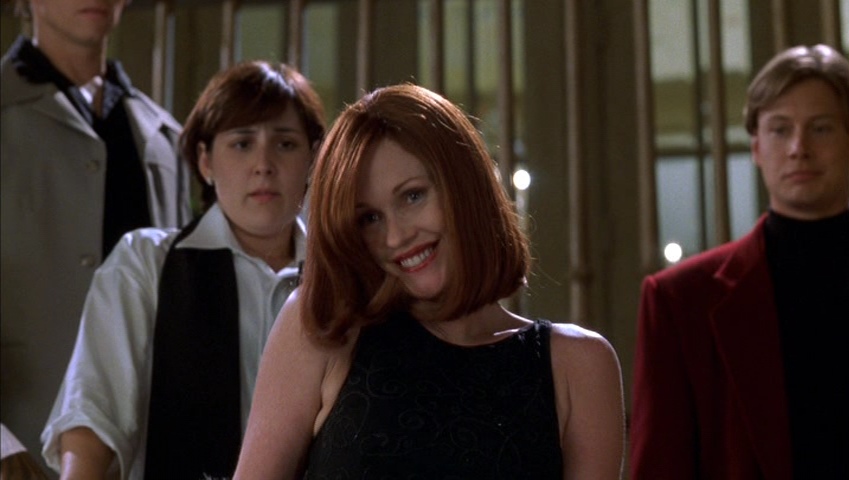
You fake it ’til you make it in Hollywood, and the same can go for anywhere sycophants and the repressed thrive. In Baltimore, the phony politeness of the ‘Sprocket Holes’ gang, led by Cecil B. Demented (Stephen Dorff), is no less comically insincere than their theatre boss promising the leading lady Honey Whitlock (Melanie Griffith) “is meant to be really nice.” Their hollow enthusiasm towards cinematic mediocrity is only matched by Honey’s real persona. And I say persona as this callous bitchiness, pressuring her assistant to ask the manager if “Pat Nixon got fucked in this hotel”, is another joking façade to stave off her inherent boredom. Between the interminable Lifetime dramas and the gawping public, getting kidnapped and forced to star in a truly independent picture might wake her up.
As far as kidnappings go, this one’s a mess. A punchline to the rhythmic editing of each member having their own introductory shots with quippy lines readying their master plan, their execution results in aimless gunfire, civilians maced for no reason, and a Molotov lighting up the stage around a wheelchair-bound child laughing at a woman having a heart attack. She did call him a “little fucker,” to be fair. This is a prelude to their insane production style.
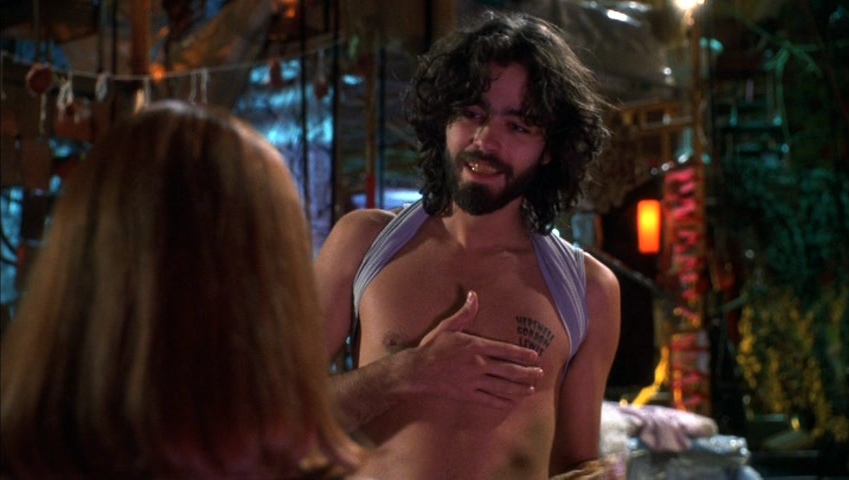
With their leading lady bleached and stripped for the role of a lifetime, her tyrannical director marches the line between law and disorder in riding boots and a straitjacket. “There are no creative differences on a Cecil B. Demented set,” he bellows while tasering his new actress. Echoing a bygone landscape, Dorff was unfamiliar with Cecil’s idol, tattooed on his body, and his own director gleefully recalled Otto Preminger as “a dictator! He used to beat his actors!” Waters never quite so directly followed in Preminger’s footsteps, but he knew what he wanted, pitching Dorff the idea four years before he even secured funding. Dorff’s wide-eyed magnetic mania is strangely alluring. I don’t get the appeal of Charles Manson or David O. Russell, but I look both ways before cheering on Cecil gunning down studio executives.
But Honey Whitlock is no victim, and she isn’t dumb; when she criticises their direction as stupid, she knows you can’t cut a movie with just masters. Of course, Cecil retorts that they “believe technique to be nothing more than failed style,” the sort of mumbo-jumbo doctrine actual cults use to validate their own crazed behaviour. Cecil B. Demented is making a bad John Waters film, but our viewing becomes more about the Making Of than their finished product. Where does the line end with their radical rambling? Cecil demands at gunpoint “no ad-libbing!” when it becomes impossible to tell their dialogue from the dialogue of their film.
“It’s the first question everybody asks, ‘Are you Cecil B. Demented?’ am I Divine? Am I Serial Mom? They’re all fantasies. They are all characters that I would like to be their friends. I would have been in his movie. I would have gone to his trial. I would have written him in prison. Certainly, I can’t deny that yes, we ran from the police when we were young, we stole equipment. Hopefully I am not as much of a megalomaniac and have a little better sense of humour.”—John Waters, writer-director.
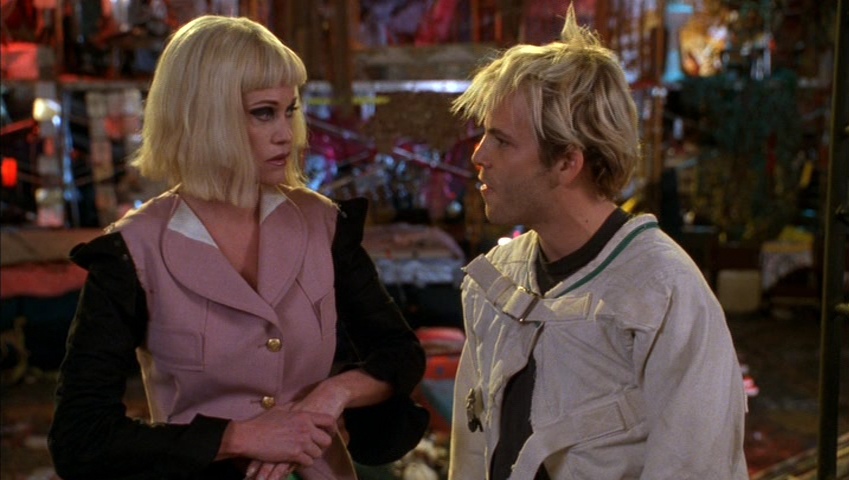
What’s equally fascinating to observe in Honey’s transformation is that she never succumbs to Stockholm Syndrome or loses herself in the performance. Her captors are violent perverts, but nothing surprises an ageing actress. Honey even struggles to stifle a giggle as Cherish (Alicia Witt) recounts, “my entire family fucked me under the Christmas tree! Jingle balls, jingle balls,” my stupid brother started singing. Waters lets Griffith embody a liberation from expectations and sensibilities, a freedom not too unfamiliar in her own storied career. From a porn star for De Palma to a businesswoman for Mike Nichols, her mother, Tippi Hedren, survived fake birds and then dragged her daughter into living with real lions. Honey’s reinvention is a parallel or inversion to another of Waters’ idols—political prisoner, convicted bank robber, actress and friend, Patty Hearst.
“I was obsessed by her. She later said to me that it was because of people like me that she went to prison. She was right. Because I wanted her to be someone she wasn’t. Bad taste would be asking her to be in a bank robbery scene. She never used to sign autographs when she was asked for them. Why would she: she was a kidnap victim? But now that she’s been in four movies: it’s given her freedom to sign autographs. Finally, a way to have some sort of pleasure from this celebrity that she didn’t ask for when it happened.”—John Waters.
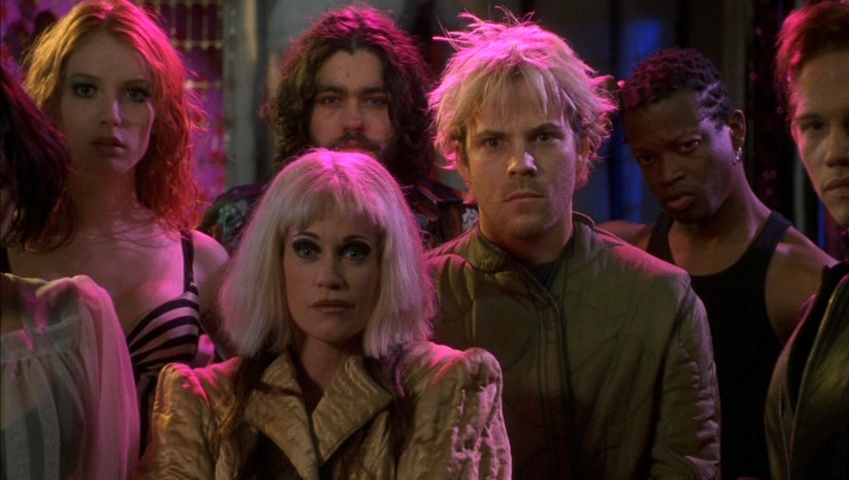
Bad taste feels right up his alley when directing Maggie Gyllenhaal to chug goat’s piss or Michael Shannon to chug cock during a police shootout. Contrast this sleaze with the pop culture parodies like a $65M sequel, shot entirely in Baltimore, Gump Again starring Kevin Nealon, and you can feel the film veering to hit broad and surreal targets. Running from a mob of bloodthirsty teamsters, the gang seeks refuge in an “all-anal movie marathon” where the main star Cherish commands her zombie-like gooner fans to their rescue. Flagrantly bizarre, there is a cutesy nostalgia to Waters referencing the Richard Gere urban legend with Alicia Witt and a gerbil.
It’s not all without reason, as Waters affirms, “There is such a thing as movie politics: it can matter where you buy your ticket, what time of day, what candy you buy.” We revisit the same talking point of having our voices heard with our wallets, and then the latest Jurassic World makes like a billion dollars, anyway. Demented suggests a Fight Club (1999) approach of infiltrating and dismantling the system from within, and yet like that film where starting fights in the street is far easier than levelling several banks, the targets of violence here are debatable. The local manager at the Movies at the Mall exclaims “I didn’t make the movie!” before receiving a shotgun butt to the nose. People crying at Patch Adams: The Director’s Cut are tear-gassed. In a moment evocative of Nazi Germany, a random suit excuses himself with “I was just following studio orders!” Honey falls in line with some of their beliefs, but let’s not forget they are terrorists. A curious choice by Waters; even when Honey attempts to fire her gun, she never actually kills anyone. His friend Patty Hearst famously entered a bank with a machine-gun but similarly never went all the way.
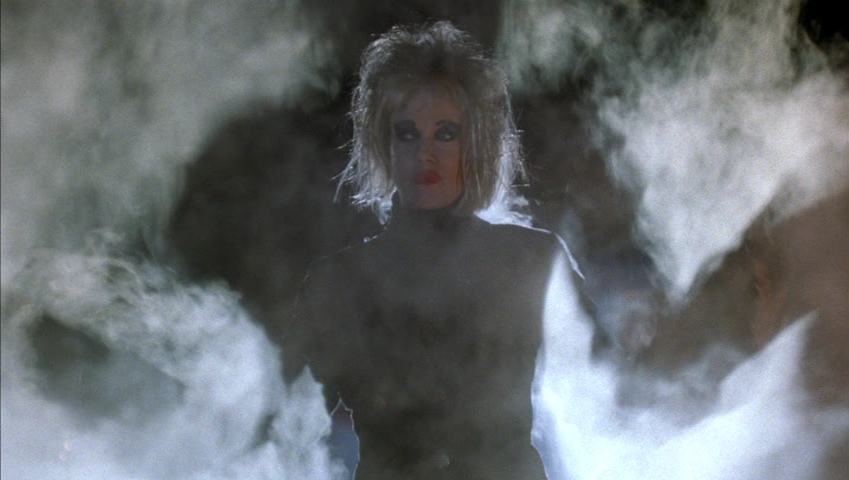
Critic Roger Ebert held a gripe against this that has irritated me as I’ve noticed it with other critics: an almost instinctive revulsion to filmmakers enjoying themselves. Tom Green (Freddy Got Fingered), Norm Macdonald (Dirty Work), Tim Heidecker and Eric Wareheim (Billion Dollar Movie), and Zach Cregger and Trevor Moore (Miss March), all put out comedies that received a near-heretical response. As Ebert called the Sprocket Holes, so were these exuberant go-getters tarred and feathered as “a bunch of kids goofing off.” This is a motion picture! You must take it seriously! Perhaps these aggressive negative reviews were a knee-jerk reaction to the perceived insult to their professions. The similarly plotted Bowfinger (1999) starred Steve Martin desperately pining to be recognised in Hollywood. Cecil B. Demented would shoot Bowfinger in the head on his way to burn the city down.
But Waters survived and endured his contentious debut; this was his twelfth feature film. Ebert reconciled the director’s progress “from the raunchy early sleazoids like Pink Flamingos, through his transitional phase, Polyester, to his studio productions Hairspray, Cry-Baby, Serial Mom. Now he seems to have returned to his middle period again, if such a thing is possible.” Fans want Waters to return to his sleazoid roots and put every next release on that pedestal of expectations, when the man himself has confessed Hollywood is a necessary evil in which even he follows orders.
“The modern, real-world equivalents of Cecil and his gang aren’t hampered by such resentments. Thanks to digital movie-making and internet distribution, the two most familiar excuses of wannabe film artistes? ‘The industry is keeping me down,’ and ‘The film-making process is very expensive’ have been eliminated,” so claimed Chelsea News in 2015. And 10 years on, that’s bullshit. David Lynch, in the last remaining years of his life, struggled not only with emphysema but funding his next works. He passed away at 78 and Netflix had the fucking ghoulish ego to boast they were in talks with him during their memorial post. John Waters is 79 and had to announce that his film Liarmouth, with Aubrey Plaza attached, is no longer happening. Cecil B. Demented is currently his second-to-last film, with A Dirty Shame (2004) being his final work.
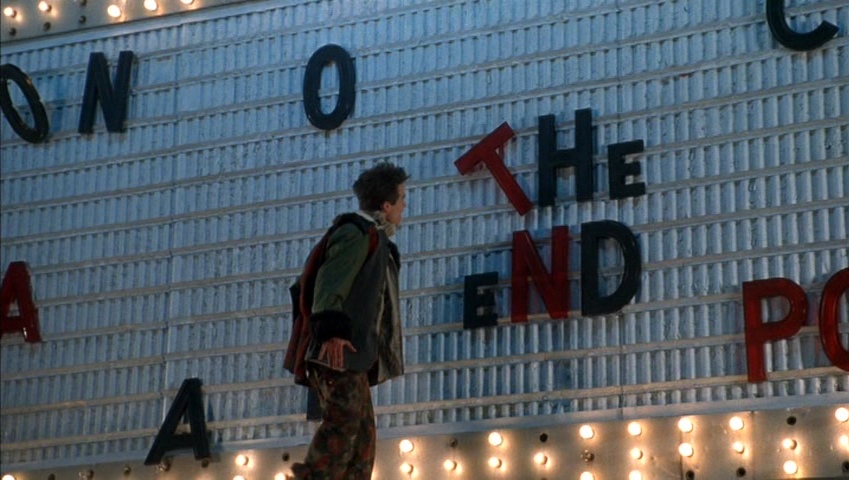
We need someone like Cecil to judge the cinematic landscape today; he wouldn’t be all disappointed. The real-life equivalent renegade, Vera Drew, wrote and directed her semi-autobiographical The People’s Joker (2022) and won the legal fight against Warner Bros. for her steadfast belief that the audience owned these intellectual properties as much as the corporations. And in his older years, Cecil may just laugh at Waters opening his film with a joke about Star Wars never leaving the big screen when, 25 years later, Revenge of the Sith (2005) is making $34M in anniversary showings, which the people are claiming as revolutionary against streaming CEOs insisting cinemas are dead.
Cecil B. Demented, on a budget of $10M, made only $2M back, with reviews aggregated at a middling 52% on Rotten Tomatoes. But the film doesn’t end with the Sprocket Holes at the red carpet; it climaxes with them all having public sex the moment they capture their last shot. The achievement is that they made the film, not how well it did at the box office. After the whiplash soundtrack of screaming metal and hip-hop (rap lyrics by Waters himself), it ends with Honey embracing her newfound self-worth to the tunes of Liberace. A callback not only to a pop culture persona she derided at the start but to a life lived in denial right to the very end. There are no unanimous wins in Hollywood; some crowds boo while others cheer, and then those sides may switch for the next release. We may never see John Waters’ name on the big screen again, but through his existing work, we can all live demented forever.
USA • FRANCE | 2000 | 88 MINUTES | 1.85:1 | COLOUR | ENGLISH


writer & director: John Waters.
starring: Stephen Dorff, Melanie Griffith, Alicia Witt, Adrien Grenier, Larry Gilliard Jr., Zenzele Uzoma, Maggie Gyllenhaal, Michael Shannon, Jack Noseworthy, Eric Barry, Patricia Hearst, Eric Roberts, Mink Stole, Ricki Lake & Kevin Nealon.
